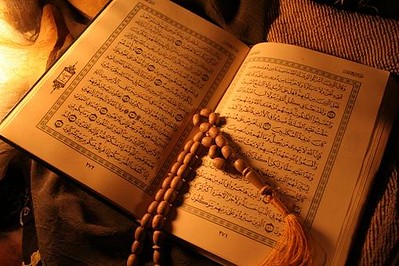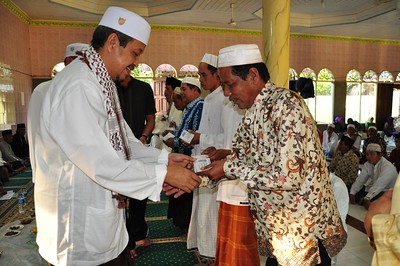40 Light and Inspirational Spongebob Wise Words
Here are some light and inspirational Spongebob wise words. Let's check them out, KLovers.

Kapanlagi.com - Waqf has certainly become a familiar term to the general public, especially for Muslims. Because waqf is one of the Islamic sharia, which is related to donating property for the permanent benefit of the community. In practice, we often encounter people who dedicate part of their property. Waqf land for mosque construction, burial, and so on.
It is important for Muslims to know and understand what waqf is. Waqf is one of the ways for Muslims to obtain uninterrupted rewards. Because waqf can also be classified as a continuous charity whose goodness rewards will not be interrupted even after someone has passed away. However, of course, performing waqf may not be as easy as giving regular charity.
Therefore, it is important to understand that waqf is an effort of giving charity that brings many benefits. In addition, Muslims also need to understand the laws of waqf, as well as its virtues. Summarized from various sources, here is the explanation.

(credit: flickr)
For Muslims, knowing what wakaf is has become a necessity. Wakaf is no different from other acts of worship or good deeds in Islam. Therefore, it is important to understand it fundamentally, starting from its definition. As mentioned earlier, the definition of wakaf is the permanent donation of wealth to be used for the benefit of the community.
By endowing, the donated wealth will provide benefits to society. Whether it is in the field of social, education, religion, and so on. Because wakaf can be done with any good intention as long as it is done sincerely and hoping for the blessings of Allah SWT.

(credit: flickr)
Endowment is a charity that has many virtues. The virtues of endowment are contained in several verses of the Quran and Hadith. Some of the verses in the Quran that discuss endowment are as follows.
1. "O you who have believed, spend from the good things which you have earned and from that which We have produced for you from the earth." (Surah Al-Baqarah, verse 267).
2. "You will never attain righteousness until you spend from that which you love. And whatever you spend - indeed, Allah is Knowing of it." (Surah Ali 'Imran, verse 92).
3. "... And cooperate in righteousness and piety, but do not cooperate in sin and aggression. And fear Allah; indeed, Allah is severe in penalty." (Surah Al-Ma'idah, verse 2).
In addition to the verses of the Quran, Prophet Muhammad (PBUH) also mentioned endowment in his hadith. In a hadith narrated by Muslim, the Prophet said, "When the son of Adam dies, his deeds come to an end except for three: ongoing charity, beneficial knowledge, and a righteous child who prays for him."

(credit: flickr)
Like other religious rituals in Islam, waqf also has principles and conditions that must be fulfilled. According to Jumhur, Mazhab Syafi'I, Maliki, and Hambali, the principles of waqf consist of four elements. The four principles of waqf are as follows.
1. The person who waqf (waqif).
2. The object being waqf (mauquf).
3. The waqf recipient (nadzir).
4. The ijab qobul declaration of waqf transfer.
Meanwhile, in addition to the principles, waqf also has several conditions that must be fulfilled. The conditions of waqf are as follows.
1. Waqf must be carried out by the person who is the direct owner of the object being waqf. In addition, the waqf giver (wakif) must also be of legal age and voluntarily perform the waqf.
2. The object being waqf is an everlasting entity, meaning that the object or item will not be damaged when utilized. Furthermore, the waqf property should also be clearly and explicitly mentioned to whom and for what purpose the object is being waqf.
3. The waqf recipient must be someone who is truly deserving, and it is not permissible to waqf to a slave.
4. The waqf declaration or ijab qobul must be clearly stated, either orally or in writing.
5. Waqf must be done in cash because waqf means transferring the waqf immediately. Thus, the transfer of rights occurs at the time the ijab qobul of waqf takes place.
Waqf is a noble act or practice in Islam. For those who do it, they will receive tremendous rewards. In addition, there are several wisdoms behind the act of waqf. The wisdoms of waqf are as follows.
1. Getting Closer to Allah
The first and foremost wisdom of waqf is getting closer to Allah. Allah will protect the eyes, hands, feet, ears, and the whole body of those who perform waqf from danger. Moreover, waqf, which is considered as a perpetual charity, will also keep a Muslim away from the hellfire.
2. Strengthening Faith and Piety
Performing waqf can be a proof of faith and piety for a Muslim. Moreover, waqf is done sincerely by donating one's wealth for the benefit of the community solely to seek the pleasure of Allah SWT.
3. Welfare of the Community
Waqf is done for the benefit of the community, such as the construction of mosques, schools, hospitals, cemeteries, and so on. It means that indirectly, performing waqf also helps fulfill the needs of the community. Therefore, someone who performs waqf is also contributing to the welfare of the community.
4. As an Investment in Rewards
As mentioned earlier, waqf is a form of charity that is classified as perpetual charity. Hence, the rewards of waqf will continue to flow even after one's death. This means that the property that is dedicated is like an investment of rewards for those who perform waqf.
Those are some of the explanations about waqf, which is an effort to donate property for the benefit of the community, as well as its virtues. Hopefully, it is useful and can increase insight.
(kpl/psp)
Cobain For You Page (FYP) Yang kamu suka ada di sini,
lihat isinya
Here are some light and inspirational Spongebob wise words. Let's check them out, KLovers.
The causes of heat stroke can occur due to various triggering factors that cause various complaints and increase the risk of throat inflammation.
In general, vertigo is a type of headache that can create a sensation of the surrounding space spinning. What are the causes, symptoms, and how to overcome it?
Have you applied consuming healthy drinks? Well, if you want to truly obtain a healthy body, it's good for you to also know the types of healthy drinks that have a lot of benefits for the body. What are they?
Dropshipping business is the sale of goods without product stock. This means that dropshippers are one way to start a business for those of you who are constrained by capital. How is the explanation?
Dieting is one of the things many people do to achieve their ideal weight. Did you know that there are several types of bread that are high in fiber and make you feel full longer? This is what can make you effective in losing weight.
Here are some benefits of paracetamol for the body's health, and its dosage. What are its benefits? Let's check it out, KLovers.
Here are some benefits of chili for body health, and you must know them. What are the benefits? Let's check it out KLovers.
As the name suggests, floor exercise is a gymnastics sport performed on the floor. What is a more detailed explanation?
Although wound care has the same basic principles, the steps for caring for them are different. So, before knowing how to care for wounds, it's good to know the types of wounds so that you won't make mistakes when providing first aid. Curious?
To better understand the meaning of gotong royong and the importance of preserving this culture, read the following review.
Vomiting blood is a condition in which a person experiences vomiting accompanied by the discharge of blood. The causes of vomiting blood can come from various triggering factors but are closely related to digestive problems.